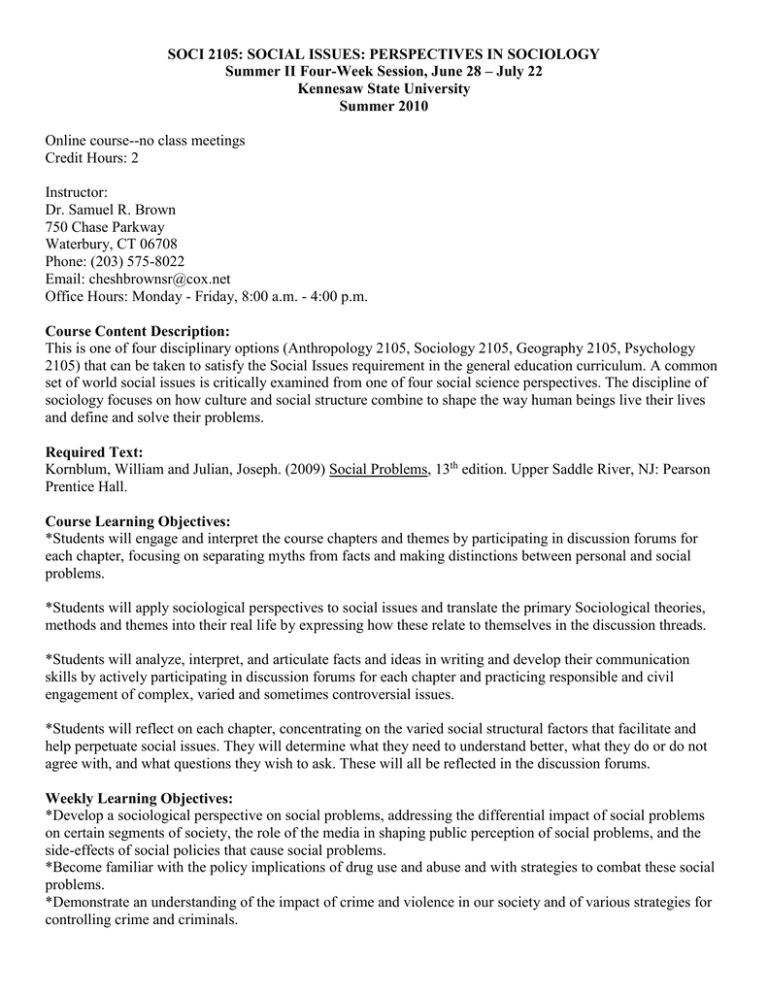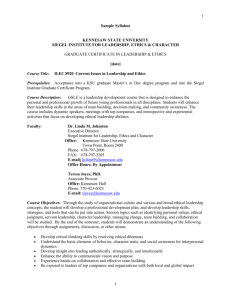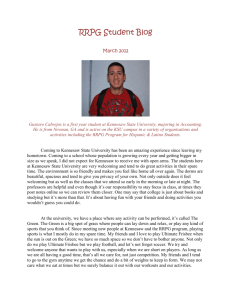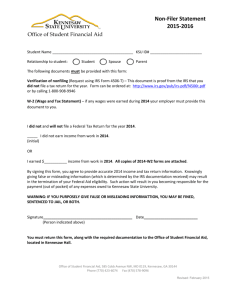
SOCI 2105: SOCIAL ISSUES: PERSPECTIVES IN SOCIOLOGY
Summer II Four-Week Session, June 28 – July 22
Kennesaw State University
Summer 2010
Online course--no class meetings
Credit Hours: 2
Instructor:
Dr. Samuel R. Brown
750 Chase Parkway
Waterbury, CT 06708
Phone: (203) 575-8022
Email: cheshbrownsr@cox.net
Office Hours: Monday - Friday, 8:00 a.m. - 4:00 p.m.
Course Content Description:
This is one of four disciplinary options (Anthropology 2105, Sociology 2105, Geography 2105, Psychology
2105) that can be taken to satisfy the Social Issues requirement in the general education curriculum. A common
set of world social issues is critically examined from one of four social science perspectives. The discipline of
sociology focuses on how culture and social structure combine to shape the way human beings live their lives
and define and solve their problems.
Required Text:
Kornblum, William and Julian, Joseph. (2009) Social Problems, 13th edition. Upper Saddle River, NJ: Pearson
Prentice Hall.
Course Learning Objectives:
*Students will engage and interpret the course chapters and themes by participating in discussion forums for
each chapter, focusing on separating myths from facts and making distinctions between personal and social
problems.
*Students will apply sociological perspectives to social issues and translate the primary Sociological theories,
methods and themes into their real life by expressing how these relate to themselves in the discussion threads.
*Students will analyze, interpret, and articulate facts and ideas in writing and develop their communication
skills by actively participating in discussion forums for each chapter and practicing responsible and civil
engagement of complex, varied and sometimes controversial issues.
*Students will reflect on each chapter, concentrating on the varied social structural factors that facilitate and
help perpetuate social issues. They will determine what they need to understand better, what they do or do not
agree with, and what questions they wish to ask. These will all be reflected in the discussion forums.
Weekly Learning Objectives:
*Develop a sociological perspective on social problems, addressing the differential impact of social problems
on certain segments of society, the role of the media in shaping public perception of social problems, and the
side-effects of social policies that cause social problems.
*Become familiar with the policy implications of drug use and abuse and with strategies to combat these social
problems.
*Demonstrate an understanding of the impact of crime and violence in our society and of various strategies for
controlling crime and criminals.
*Provide a definition of poverty and myths associated with it. Discuss social policies that are meant to combat
poverty.
*Discuss how various racial and ethnic groups have dealt with racism, prejudice, and discrimination.
*Become familiar with how gender and sexuality have become important issues in the workplace.
*Demonstrate an understanding of key issues facing older Americans today and social policies that were put
into place to address their concerns.
*Discuss the problems of work and the economy as they relate to workers and their place in society.
*Become familiar with the impact of technology on the environment and with how technology affects society.
*Demonstrate an understanding terrorism and war in society, including the direct and indirect effects of war and
how technology affects the ways in which wars are waged.
Meeting Learning Objectives:
In order to meet the Course and Weekly Learning Objectives students should read the relevant chapters each
week, read the journal articles available through GALILEO, and participate in the Lecture Question (LQ) and
Discussion Question (DQ) Discussion Boards.
Prerequisites:
While there are no official prerequisites for this course there are some considerations that each student must
make. The online method of course delivery is different from the classroom environment and requires the
following minimum student preparation:
Self Discipline
With Internet courses the instructor remains a valuable resource; however, the day-to-day instruction is not
there and requires the student to become proactive in their learning. The student must be self-disciplined in
order to be successful. Time management and organizational skills are a must in order to excel.
Critical Reading
A characteristic of online course delivery is the amount of reading required. Students have become accustomed
to instructors explaining the text. This has resulted in students' not reading as much or not paying as much
attention to what they read. In an online course, students must keep up with reading assignments and
comprehend what they read.
Computer Skills
To do well in this course it is necessary that students have certain computer and Internet skills, such as being
familiar with email (including attaching documents), searching databases, netiquette, and reading large amounts
of text on screen.
ADA Considerations:
If you are a student who is disabled as defined under the Americans with Disabilities Act and require assistance
or support services, please seek assistance through the disAbled Student Support Services. Carol Pope, the
Assistant Director, will gladly assist you. You may contact her at 770-423-6443 or cpope@kennesaw.edu.
Course Components:
The purpose of the course is to give students a better understanding of the place of social problems in our
society and of the various strategies to address them. The course consists of the following components-Participation
It is expected that students will participate in the class each week by contributing to the threaded discussion
questions, completing assignments in a timely fashion, and asking questions of your classmates and the
facilitator. Participation will be monitored.
Discussion Boards
There are two discussion board forums for the class—Lecture Questions (LQ)—based on the text and
Discussion Questions (DQ) based on the discussion articles available through the Academic Search Premier
database. This database is available at the following link: http://www.kennesaw.edu/library/libres/libres.htm
Choose Off-campus access to GALILEO through either of the two options. For help in accessing this database
or general searching techniques please go to http://galileo.usg.edu . For additional help please contact the KSU
Reference Desk at (770) 423-6325.
You should reply to all LQs each week and the DQs. On top of that you should reply to the comments of two
other students. For example, you could respond to someone's Lecture Question response and to someone's
Discussion Question response, you could respond to the Lecture Question responses of two other students, or
you could respond to the Discussion Question responses of two other students. Please note that participation
points are only given for the current week.
A response of That is great! or Wow! to the post of another student will not be counted as a response.
Responses must be substantive and show evidence of reflection and thought. Responses should add new
information, or in some way enhance the learning of others in the course by providing additional resources.
You’re Discussion Questions (DQ) and Lecture Questions (LQ) are due by midnight server time (eastern
zone) on Sunday of each week. Submit your DQ and LQ posts to the appropriate Discussion Board. Length
requirement is a minimum of 1,600 characters (no spaces) for each DQ. Points will be deducted for responses
that fall below this minimum. There is no length requirement for LQ's.
Determining the number of characters (no spaces) does NOT mean writing your responses with no spaces. It is
simply a count of the letters in your response, not including the spaces. Try this:
Open a blank MS Word document on your desktop. Type your response. Select Tools from the Tool Bar at the
top of the page, then Word Count. Note the number next to Characters (no spaces). Copy and paste your work
into the message box of the post on the discussion board.
There will also be a discussion board entitled Sam's Speakeasy. Please use this section to introduce yourself to
other members in the class by posting a short biography. You may also use this section to post questions you
have about how to complete an assignment, something about the course you do not understand, or use it as a
place to ask questions in general of each other. If you would like to ask the Instructor a question please put
"Question for Sam" in the subject line. Check this section each week to see if you can be of help to anyone else
in the class. Responses and questions posted here will NOT count toward weekly participation points.
NOTE: The Writing Center, located in Room 242 in the Humanities Building, is a free service available to all
members of the university community. Tutors assist writers in all aspects of writing: inventing topics,
organizing, drafting, revising, grammar, punctuation, documentation, and composing on the Word Processor.
Students needing information about the Regents Test and/or practice in writing the essay itself should contact
the Writing Center. Check the door of the Writing Center for current hours this semester, or click on the
following link: http://www.kennesaw.edu/english/WritingCenter/
Etiquette expectations for online discussions and email
I would encourage you all to contribute to the discussions in the Forums--Lecture Questions Forum and
Discussion Questions Forum. Remember: Participation is essential and important. Please be respectful of your
classmates in these discussions. Derogatory comments, inflammatory remarks, violent references, etc. will not
be tolerated. Before posting your first message become familiar with some issues regarding e-mail etiquette
found at [www.dynamoo.com/technical/etiquette.htm].
Discussion Board Forums Grading Outline:
Criteria
Critical
Thinking
A (90-100)
Outstanding
*rich in content
*full of thought,
insight, and
analysis
*Clear
connections to
previous or
Connections
current content
to real-life
situations
B (80-89)
Proficient
D/F (0-69)
Below
Expectations
*substantial
information
*thought,
insight, and
analysis has
taken place
*generally
competent
*information is
thin and
commonplace
*rudimentary
and superficial
*no analysis or
insight is
displayed
*connections
are made,
*not really
clear or too
obvious
*limited, if any
connections
*vague
generalities
*no connections
are made
*off topic
Uniqueness
*new ideas
*new
connections
made with
depth and detail
*new ideas or
connections
*lack depth
and/or detail
Timeliness
*all required
postings early in
discussion
throughout the
discussion
*all required
postings
*some not in
time for others
to read &
respond
*few
grammatical or
stylistic errors
*several
grammatical
or stylistic
errors
Stylistics
C (70-79)
Basic
*few, if any
new ideas or
connections
*rehash or
summarize
other postings
*all required
postings
*most at the
last minute
without
allowing for
response time
*obvious
grammatical or
stylistic errors
*errors
interfere with
content
*no new ideas
*I agree with …
statement
*some, or all,
required postings
missing
*obvious
grammatical or
stylistic errors
makes
understanding
impossible
Course Requirements:
1. Lecture Questions (20%)
Lecture Questions are worth five points each. There are ten lecture questions per week. Over the 4 week course
you may earn a possible 200 points from lecture questions.
Grade breakdown: 5 points * 10 questions per week * 4 weeks = 200 points
2. Discussion Questions (40%)
Discussion Questions are worth 50 points each. There will be two due on a weekly basis.
Grade breakdown: 50 points * 2 questions per week * 4 weeks = 400 points
3. Participation (40%)
Participation is worth 100 points each week. Students will participate in online discussions posted on the
Discussion Board, answering at least two posts per week. 50 points will be given for one response per week;
100 points will be given for two or more responses per week. To receive full credit (400 points for the 4 weeks)
for Participation, you should make at least two responses per week to the comments of the other students in the
class. Participation points will only be given if responses are made to all Lecture Questions and Discussion
Questions for a particular week.
Grade breakdown: 100 points * 4 weeks = 400 points
Receiving credit for late assignments:
I will grade your assignments as receiving zeroes, for administrative purposes, if they are not posted by the
deadline. Post late assignments to the Discussion Board. You will receive the grades that you would normally
have received and will not be penalized for lateness. Please note that participation credit may NOT be made
up—it is only given for the current week.
Revision of assignments:
You may resubmit assignments to be regraded with no penalty. Please resubmit them to the Discussion Board.
Completing assignments ahead of time:
You will not be penalized for completing assignments before they are due. This includes commenting on the
responses of other students. However, participation credit will not be given once the deadline for the week has
passed.
Grading:
● Lecture Questions (200 points)
● Discussion Questions (400 points)
● Participation (400 points)
Total points = 1000
Class Schedule:
See the Topic Outline below.
Grades:
A
(900-1000 points)
B
(800-899 points)
C
(700-799 points)
D
(600-699 points)
F
(Less than 600 points)
Instructor Responsiveness and Availability:
The instructor will respond to all e-mails and discussion board questions within 24-48 hours. Grades will be
posted within one week of the assignment due date.
Topic outline:
Week 1. June 28 - July 4, 2010.
Chapter 1: Sociological Perspectives on Social Problems
Chapter 4: Alcohol and Other Drugs
Go to Sam's Speakeasy Discussion Board and post your biography so that classmates may have a chance to
reply to it and become further acquainted with you. I would suggest that you cover these areas in your bio:
work, education, family, pets, leisure interests, etc.
Lecture Questions:
Post to the Lecture Questions Discussion Board--there is no minimum line length. (5 points each)
Discussion Questions: (50 points each)
Minimum of 1,600 characters (no spaces). Post to the Discussion Questions Forum.
Week 2. July 5 - 11, 2010.
Chapter 5: Crime and Violence
Chapter 6: Poverty Amid Affluence
Lecture Questions:
Post to the Lecture Questions Discussion Board--there is no minimum line length. (5 points each)
Discussion Questions: (50 points each)
Minimum of 1,600 characters (no spaces). Post to the Discussion Questions Discussion Board.
Week 3: July 12 - 18, 2010.
Chapter 7: Racism, Prejudice, and Discrimination
Chapter 8: Gender and Sexuality
Lecture Questions:
Post to the Lecture Questions Discussion Board--there is no minimum line length. (5 points each)
Discussion Questions: (50 points each)
Minimum of 1,600 characters (no spaces). Post to the Discussion Questions Discussion Board.
Week 4: July 19 - 22, 2010.
Chapter 9: An Aging Society
Chapter 12: Problems of Work and the Economy
Lecture Questions:
Post to the Lecture Questions Discussion Board--there is no minimum line length. (5 points each)
Discussion Questions: (50 points each)
Minimum of 1,600 characters (no spaces). Post to the Discussion Questions Discussion Board.
ACADEMIC INTEGRITY
In no case will academic dishonesty be tolerated. Every KSU student is responsible for upholding the provisions
of the Student Code of Conduct, as published in the undergraduate and graduate Catalogues. Section II of this
code addresses the University's policy on academic honesty, including provisions regarding plagiarism and
cheating, unauthorized access to University materials, misrepresentation/falsification of University records or
academic work, malicious removal, retention, or destruction of library materials, malicious/intentional misuse
of computer facilities and/or services, and misuse of student identification cards. Incidents of alleged academic
misconduct will be handled through the established procedures of the University Judiciary Program, which
includes either an informal resolution by a faculty member, resulting in a grade adjustment, or formal hearing
procedure, which may subject a student to the Code of Conduct's minimum one semester requirement.
EQUAL OPPORTUNITY STATEMENT
No person shall, on the grounds of race, color, sex, religion, creed, national origin, age, or disability, be
excluded from employment or participation in, be denied the benefits of, or otherwise be subjected to
discrimination under any program or activity conducted by KSU.
STATEMENT OF NON-DISCRIMINATION
Kennesaw State University supports the Civil Rights Act of 1964, Executive Order #11246, Title IX of the
Educational Amendments of 1972, Section 504 of the Rehabilitation Act of 1973, and the Americans with
Disabilities Act. No person shall, on the basis of age, race, religion, color, gender, sexual orientation, national
origin or disability, be excluded from participation in, or be denied the benefits of, or be subjected to
discrimination under any program or activity of the college. Any individual with a grievance related to the
enforcement of any of the above provisions should contact the Assistant Director of Human Resources,
Ombudsperson.
TECHNICAL SUPPORT
If you have not yet initialized or need help with your NetID account, then please go to http://netid.kennesaw.edu
for assistance.
For other Vista help, visit the Online Support Center at http://help.view.usg.edu or contact the KSU Service
Desk.
ACADEMIC SUPPORT
For Academic Support please go to the following website:
http://www.kennesaw.edu/stu_dev/alp/academicsupport.shtml
STUDENT SUPPORT
For Student Support please go to the following website:
http://ksuweb.kennesaw.edu/~shagin/KSUhelp




